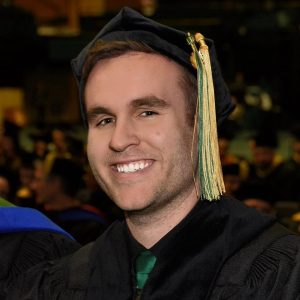July 2019 Spotlights
Student Spotlight: Ryan Roberts
 Ryan received his PhD in Human Dimensions of Natural Resources at CSU in May. His dissertation was focused on assessing the role of scientific evidence in the decision-making processes of collaborative watershed partnerships throughout the Intermountain West region. These watershed groups invest in wildfire mitigation treatments as a risk reduction strategy to avoid the negative impacts catastrophic wildfires can have on watersheds. Specifically, Ryan assessed how groups use scientific evidence to justify making investments and decide on specific wildfire treatments to employ, as well as what scientific information they relay back to their stakeholders and the public.
Ryan received his PhD in Human Dimensions of Natural Resources at CSU in May. His dissertation was focused on assessing the role of scientific evidence in the decision-making processes of collaborative watershed partnerships throughout the Intermountain West region. These watershed groups invest in wildfire mitigation treatments as a risk reduction strategy to avoid the negative impacts catastrophic wildfires can have on watersheds. Specifically, Ryan assessed how groups use scientific evidence to justify making investments and decide on specific wildfire treatments to employ, as well as what scientific information they relay back to their stakeholders and the public.
After graduating, Ryan briefly worked as a consultant for the National Park Service’s Climate Change Response Program. His project was focused on assessing the status of climate change interpretation across the National Park System. Ryan recently accepted a position with the U.S. Fish and Wildlife Service in Fort Collins as a conservation social scientist. Through this position, he will be leading a long-term visitor management program throughout the National Wildlife Refuge System. In the future, Ryan is specifically interested in conducting large-scale feasibility analyses or impact evaluations to assess the efficacy of conservation finance programs that invest in water and other natural resource conservation initiatives. If you would like to learn more about Ryan’s research and interests, please explore his LinkedIn page or email him at ryanmroberts616@gmail.com.
Faculty Spotlight: Aditi Bhaskar
 Aditi is an assistant professor in the department of Civil and Environmental Engineering. She moved to Fort Collins from Maryland, where she grew up crawling through storm sewer pipes. Today, her research focuses on hydrologic change from urban growth, which can be seen through shifting streamflow or flooding on city streets.
Aditi is an assistant professor in the department of Civil and Environmental Engineering. She moved to Fort Collins from Maryland, where she grew up crawling through storm sewer pipes. Today, her research focuses on hydrologic change from urban growth, which can be seen through shifting streamflow or flooding on city streets.
Her past and present work has investigated how stormwater management and lawn irrigation change low flows in streams, and one of her current projects was recently awarded $25,000 through the Colorado Water Center’s annual competitive grant program. The project, called Flood Tracker, collects reports of street flooding from the public. Aditi’s team is working to collect crowdsourced information because people driving, biking, walking, or bussing around town are right now our best monitors of flooding conditions on the street at that time and place. The time and place of street flooding will be used to improve predictions of urban flooding and target improvement efforts.
